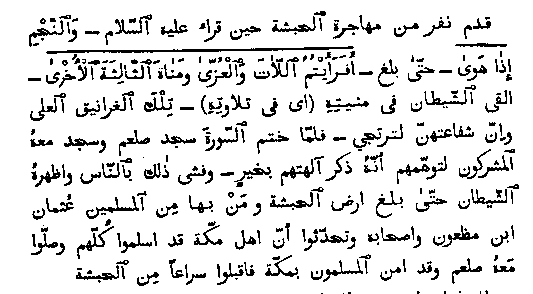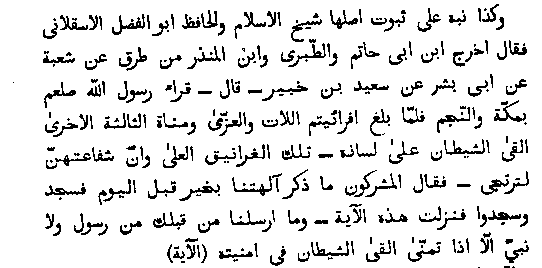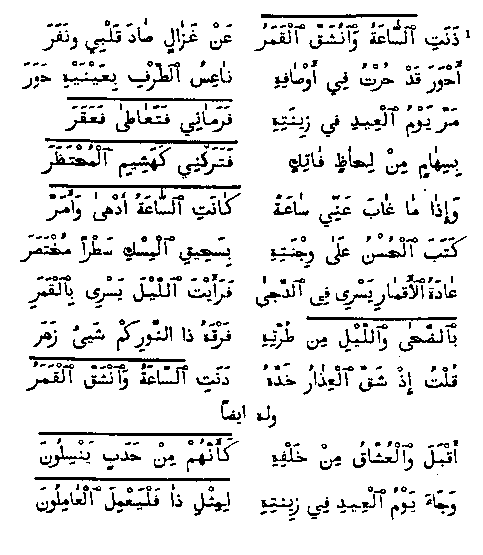2 This is not the place to enter upon the proof of the matter,
but I hold that the fact stated in the text is correct, in spite of all that has recently been written
on the other side.
3 Surah LIII., 19.
4 In Assyrian Ilu is God, ilatu is "goddess."
Allatu is probably from the Accadian.
5 As we shall have to refer to it again, it may be well to
6 Others, e.g. Prof. Sayce (in his Lectures on the Religions
of Egypt and Babylonia), hold that this was an original Semitic idea.
7 Surahs XVI., 59; LIII., 19-21, 28.
8 The
9 So also a nephew of Muhammad was called Ubaidu'llah.
10
11 For example, we find in the Diwan of An Nabighah
the following lines:—
And again:—
And so also in Poem VIII., ll. 5, 6:—
Labid has also the following verse:—
12 Quoted in Ibn Hisham's Siratu'r Rasul,
Egyptian edition, Part I., pp. 27, 38.
13 Ash Shahristani in
Surah
(Fleischer's ed., pp. 178-81.) See also on the same subject Krehl,
Über die Religion der vorislamischen Araber, pp. 4 sqq.
Surah
14
In the Mawahibu'l luduniyyah the tale is told in several forms.
One runs thus:—
Another form of the story is given in the same book in these words:—
This story is also related in much the same way by Ibn Ishaq, and it is
accepted by Ibn Hisham, the amplifier of his account of Muhammad's life
(Siratu'r Rasul, vol. i. pp. 127 sqq.). Tabari and others also give
the tale as true, as do the commentators Yahya' and Jalalu'ddin, and also
Baidawi, in commenting on Surah Al Hajj (Surah XXII.), v. 51, the verse
quoted at the end of the above extract. Al Ghazali, Baihaqi, and others
fiercely deny the truth of the prophet's fall into approval of idolatry,
even for a moment. But, unless the story be true, it is difficult to account
for its acceptance by the above authorities; and the verse we have just
referred to seems to require the story to explain it.
15 Surah LIII., An Najm, 21, 22, 23.
16 Siratu'r Rasul, pp. 27 sqq.
17 Ibid.
18 Herodotus III. 8, quoted above, p. 32.
19 Regarding the observance of the month of Ramadan
as a time of "penance," vide pp. 269 sqq.
20 Quoted above, p. 32.
21 Some Arabs wear their hair long, as they used to do
in Muhammad's time. There seems to be no religious rule on the subject, hence
the difference in Muslim practice in different places.
22 Hist. Ante-Islamica, ed. Fleischer, p. 180.
23 That is the time before Muhammad's mission.
24 See also the Apology of Al Kindi,
Sir W. Muir's translation, pp. 92, 93.
25 As is well known, this pilgrimage to Mecca is still
incumbent upon every male Muslim who can possibly make it.
26 Others say that the heathen Arabs used to perform
the Tawwaf (the ceremony of running round the Ka'bah) naked, but that Muhammad
introduced the wearing of the Ihram.
27 In Islamic times this unfortunately went out of use.
28 As in the Laws of Amraphel (Hammurabi).
29
30 Siratu'r Rasul, part I., p. 27:—
31 Muhammad has also borrowed certain fables
current among the heathen Arabs, such as the tales of 'Ad and Thamud and some
others (Surah VII., 63-77). Regarding such stories Al Kindi well says to his opponent:
"And if thou mentionest the tale of 'Ad and Thamud and the Camel and the Comrades
of the Elephant" (Surahs CV., and XIV., 9) "and the like of these tales, we say to thee,
‘Those are senseless stories and the nonsensical fables of old women of the Arabs,
who kept reciting them night and day’":—
Sprenger (quoted in Rodwell's Preface, p. xvii) thinks that Muhammad learnt the tales of 'Ad
and Thamud from the Hanifs (see chapter vi of the present volume), and that the latter were
Sabians and held sacred the "Volumes of Abraham" mentioned in Surah LXXXVII., 19 in
which Apocryphal books these tales may have found place. But this can hardly be considered
as proved. May not the "Testament of Abraham" (rediscovered a few years ago), of which
we shall have to speak in chapter iv, be included among the Suhuf Ibrahim?
32
33 Regarding the Mu'allaqat it may be well
to quote the following from Abu Ja'far Ahmad ibn Isma'il an Nahhas (died A.D. 338,).
He says:—
As Suyuti says very much the same, though he also refers to the story that the verses
were hung up in the Ka'bah as possible (Mudhkir, II., 240).
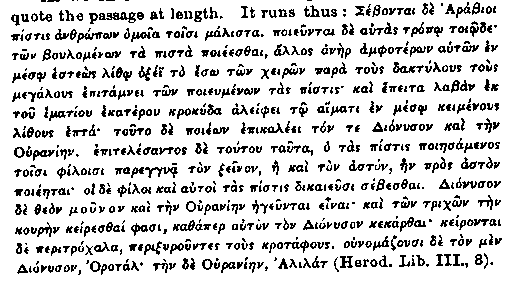
 of Herodotus has doubtless
preserved in its last syllable the word Ta'ala'. The first part of the word is of uncertain
derivation: it may be a corruption of Allah. With Allah Ta'ala' cf. the
of Herodotus has doubtless
preserved in its last syllable the word Ta'ala'. The first part of the word is of uncertain
derivation: it may be a corruption of Allah. With Allah Ta'ala' cf. the
 of Gen. xiv. 18, 19, 22.
of Gen. xiv. 18, 19, 22.


(Poem I., ll. 23, 24, ed. Ahlwardt.)

(Poem III., ll. 9, 10.)


 quoted by Abu'l Fida (Hist. Ante-Islamica):—
quoted by Abu'l Fida (Hist. Ante-Islamica):—

 (Surah XLV., 23).
(Surah XLV., 23).
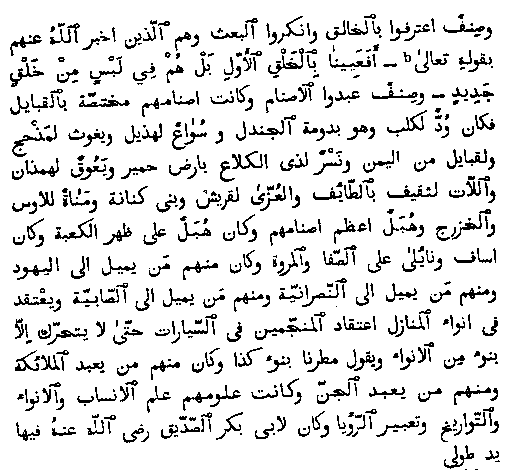
 (Surah L., 14).
(Surah L., 14).
